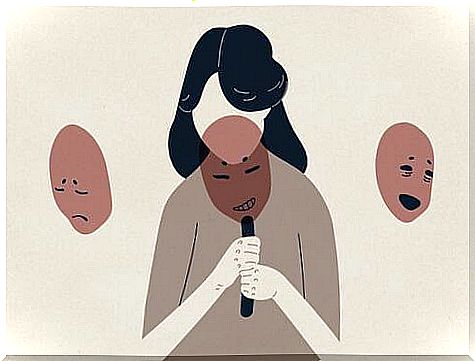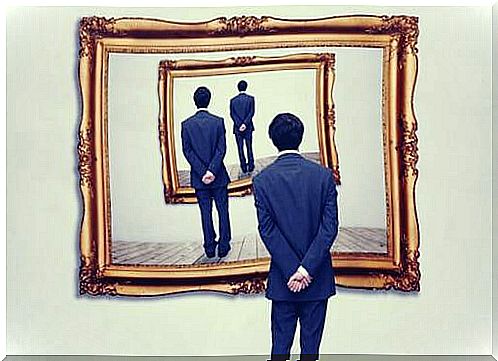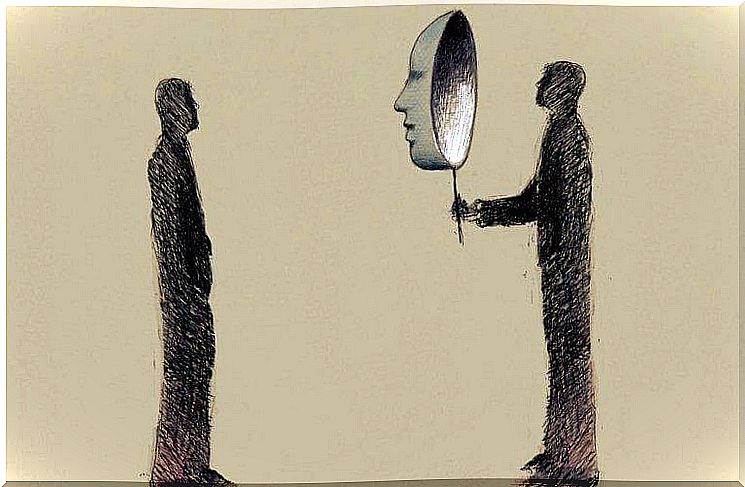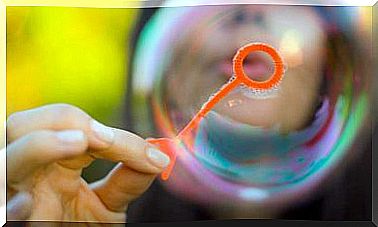The Three Masks Of Pathological Narcissism

The three masks of pathological narcissism are manipulative mechanisms used by narcissists to hide what they are up to and who they really are. You don’t want to appear complacent or arrogant to others. That’s why they put on masks to hide behind. Sometimes they succeed in doing this and ultimately confuse the people around them.
A narcissist is a person who overestimates and overestimates himself. Pathological narcissism is when a person overestimates himself and at the same time has the extreme need to be admired by others. Behind this there is a subconscious contempt for oneself.
“Postmodernism is just an additional level on the scale of personalization of the individual who has subscribed to narcissistic self-service and indifferent kaleidoscopic combinations.”
G. Lipovetsky
Distorted narcissism can be toxic to others. In their quest to assert themselves, such a person becomes manipulative, cruel, or abusive towards others. He does not do this consciously, but he deceives his counterpart with his behavior. He puts on the masks of pathological narcissism to convince himself and others that his pride is not excessive.
The three masks of pathological narcissism
1. Fictional self-improvement
Fictional self-improvement is one of the masks of pathological narcissism. Essentially, it consists of making progress, developing, or growing, not with the sincere goal of being better yourself, but rather arousing admiration, envy, or submission in others.

One of the characteristics of pathological narcissism is that it displays a type of self-worth known as “contingent self-worth”. This means that self-esteem does not start from a positive self-image, but depends on how much others appreciate the pathological narcissist.
Therefore, as a means to an end, these people seek to be better people. Your ultimate goal is to impose yourself on others, to get them to submit to your ideas or to feel inferior. Something that this mask of pathological narcissism betrays is the fact that it constantly and publicly boasts of its advances. He also accuses others of neglecting them or emphasizing them enough.
2. Self-abandonment
It is one of the most deceptive masks of pathological narcissism. It stands for the behavior of a person who takes on responsibilities that are not due to them in order to supposedly help others to solve their problems. They even make possessions and privileges their own or suffer for others in difficult situations.
The problem with this is that they do not have good intentions towards others. Instead, they want to create authority and a dependency between them and others. By giving up themselves, they can lead others to believe in kindness, generosity, or willingness to make sacrifices. The sole purpose of this is to pursue an even more selfish goal: to boast about it.

This mask also falls off very quickly. Those who sacrifice themselves will not wait long to communicate this to those for whom they are doing it. He will try to make those people he “helps” feel guilty, will ask for special treatment or for more recognition. He would like to be placed on a pedestal in comparison to others. It is often the case that pathological narcissists literally push themselves into the role of victim.
3. See yourself as great
People with pathological narcissism see themselves as great. In principle, they feel better than others, at least at the level of consciousness. They constantly compare themselves to others and always win that comparison in their eyes. They are stronger, more tolerant, more productive and better overall, although that is not true.
One of the main characteristics of this personality type is that these people believe they have a right to be angry. In other words, they assume that getting angry is always justified. Your anger is sacred. If they explode, it’s because others made them explode. If they scream, it’s because they can’t tolerate someone being unfair to a good person like them. If they become offensive, it is because they want to avoid injustice or generate praise.

Sometimes they convince others of it. A very typical case for this are superiors who abuse their employees because of a supposed desire for improvement and perfection. Sometimes a whole group falls victim to this pathological narcissist’s idea of being great. Or a nation.
The masks of pathological narcissism are mechanisms to hide the real you. A narcissist doesn’t want to be seen as such by others. Therefore, he uses these tools with which he can cover up his basic traits. A person who behaves like this suffers deep inside and above all needs help.








